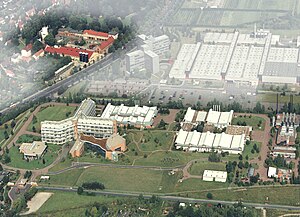 Image via Wikipedia
Image via WikipediaBy Political Capital
The study of so-called radical rightist ideologies and politicians is receiving increasing public attention throughout Europe. In this context it is important to identify the diversity and internal divisions of these political movements.
In many respects the differences and similarities can be accurately described based on geographic location. Taking this model as a working hypothesis, in the coming months Political Capital will present the striking differences of the Western and Eastern versions of far right ideologies, with special emphasis on the social context, as well as the issues and topics constituting the organizational building blocks of the far right.
In our first study we analyze the position of the far right in respect to the gay rights movement with a special focus on Balkan countries aspiring to enter the European Union.
Fault lines running east and west
The massacre committed by Anders Behring Breivik in Norway appears to represent a watershed in thinking about far-right ideologies. Since the attack there has been a growing consensus among the European public the in the past decade Western decision-makers have been excessively preoccupied with Islam radicalism while they overlooked threats posed by the proliferation of extremist right-wing ideologies. Presumably, this is related to the relative integration of the radical right in Northern and West Europe; parties promoting such ideas have accommodated to democratic political institutions. In contrast, some countries in Southern and most in Eastern Europe present an altogether different picture.
In essence, the ideologies of the far right in the West and the East are essentially the inverses of each other. The Western and Eastern versions are both characterized by neo-populism, i.e., giving simplistic and provocative answers to socially divisive issues. However, those in the East are often also ‘neo-Fascists’ in the sense that in their self-definition and symbols they find inspiration in the political legacy of totalitarian regimes active in their respective countries between the two world wars.
The far right in Western Europe is characterized by shrill Islamophobia while it is not anti-Semitic, in contrast to the East European version that is strongly anti-Jewish for the most part and often pro-Muslim (see Hungarian Jobbik). When it comes to the state and the economy, most far-right movements in the West are neo-liberals, while their East European counterparts are advocates of a strong state. They also show significant differences when it comes to their attitudes toward minorities.
Discriminating policies of Westerners can be described as the intolerance of the tolerant (Cas Mudde), i.e., they are hostile to immigrants rejecting liberal values and violating the rights of, for instance, women and gays. While Breivik himself, according to his book, is rather hostile to gays, the organizations he refers to are typically more ‘homophile’ than homophobe.
In contrast, East Europeans are fundamentally intolerant of minorities, where the rejection of sexual minorities in but one typical case in point. In South-Eastern Europe most centrist parties are also hostile or ambivalent when it comes to this issue. Obviously this is a reflection of the social environment; in these countries the public is profoundly hostile to gays, demonstrated by its rejection of considering their public presence and rights as a public issue and the frequent atrocities accompanying gay parades.
The recognition of gay rights: tensions between internal and external requirements











![Reblog this post [with Zemanta]](http://img.zemanta.com/reblog_e.png?x-id=47830327-255b-493b-80fc-cdf3908fcc6a)


![Reblog this post [with Zemanta]](http://img.zemanta.com/reblog_e.png?x-id=2f2dd53b-3e9b-4a97-8c40-886b72d63166)

![Reblog this post [with Zemanta]](http://img.zemanta.com/reblog_e.png?x-id=09f1c776-5da7-4384-b788-e28f9e3518d5)





 Join our page
Join our page

